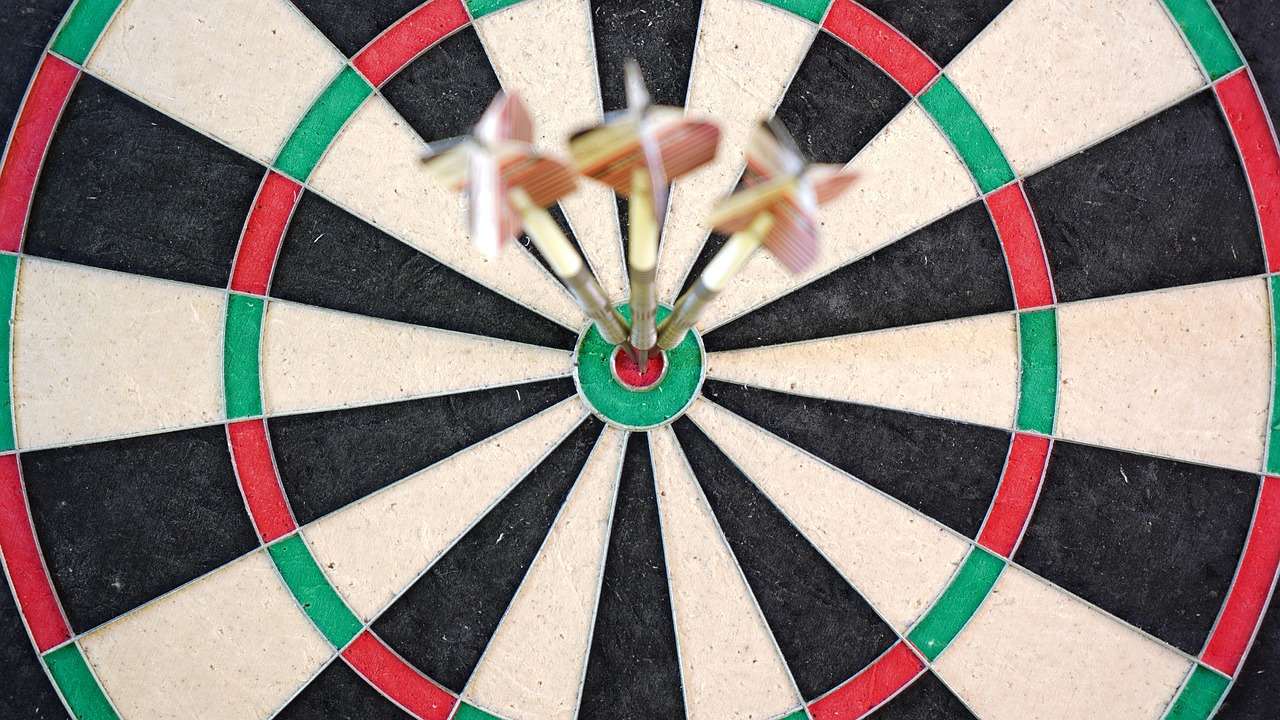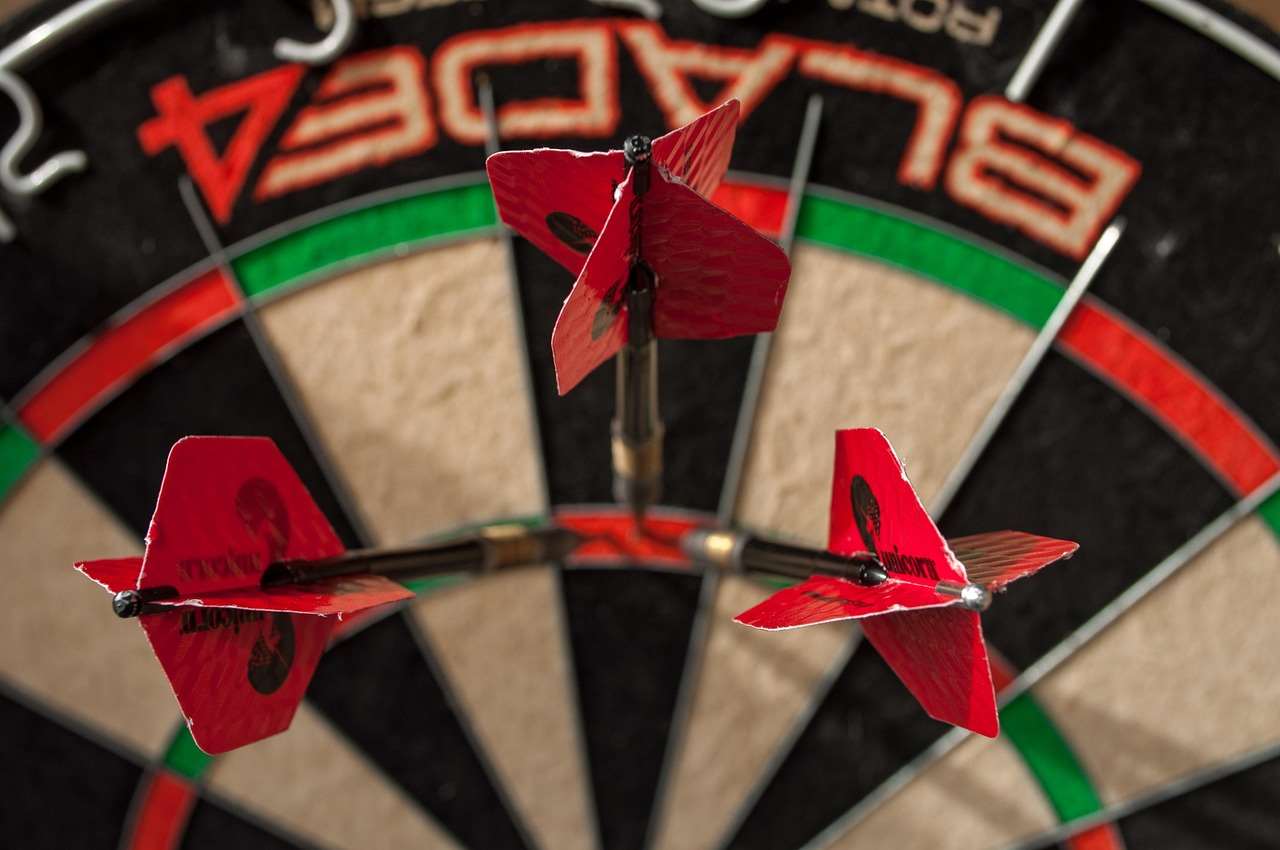Mastering the darts throw release is crucial for consistent accuracy and improved scoring; it’s the final step that determines where your dart lands. This article will break down the key elements of a proper release, helping you develop a smoother, more controlled throwing motion. We’ll also cover common mistakes and provide drills to enhance your technique.
⚠️ Still Using Pen & Paper (or a Chalkboard)?! ⚠️
Step into the future! The Dart Counter App handles all the scoring, suggests checkouts, and tracks your stats automatically. It's easier than you think!
Try the Smart Dart Counter App FREE!Ready for an upgrade? Click above!
Understanding the Key Components of a Darts Throw Release
The darts throw release isn’t just about letting go of the dart; it’s the culmination of your entire throwing motion. A clean and consistent release allows for greater control and predictability. Several factors contribute to a successful release, including grip, stance, arm action, and follow-through.
Grip and its Impact on Release
Your grip dictates how the dart sits in your hand and how it’s propelled forward. Experiment with different grip styles (e.g., two-finger, three-finger) to find what feels most natural and allows for a secure hold. The grip should be firm enough to maintain control but not so tight that it induces tension. A relaxed grip generally leads to a cleaner darts throw release. Find a grip that lets you comfortably release the dart without excessive wrist movement.
Stance and Balance
A stable stance is fundamental for consistent throws. Position yourself comfortably at the oche, maintaining balance throughout your motion. Most players prefer a slight angle to the board. Shift your weight subtly as you draw back and release the dart. A balanced stance minimizes unwanted movement during the critical darts throw release phase.

The Arm Action: From Drawback to Release
The arm action should be smooth and controlled, resembling a pendulum. Avoid jerking or excessive wrist flicking. Pull the dart back in a straight line towards your eye, maintaining a consistent elbow position. The darts throw release should occur as the arm swings forward, propelling the dart towards the target. This consistent arm movement is key to repeatable accuracy. Your elbow should be your pivot point during the throw.
The Follow-Through: Completing the Motion
The follow-through is just as important as the initial stages of your throw. Extend your arm fully towards the target after releasing the dart. A proper follow-through helps maintain accuracy and ensures a smooth deceleration. Think of your hand pointing towards the target after the darts throw release. Imagine reaching out to shake hands with the dartboard.
Common Mistakes in Darts Throw Release and How to Fix Them
Even experienced players can fall victim to common mistakes that negatively impact their darts throw release. Recognizing and addressing these errors is crucial for improvement.
Wrist Flicking and Its Negative Effects
Excessive wrist flicking can lead to inconsistent releases and unpredictable dart trajectories. While a small amount of wrist movement is natural, overdoing it introduces variability. Focus on using your arm as the primary source of power and control. Try to keep your wrist relatively stable during the darts throw release. Practicing slow, deliberate throws can help minimize wrist flicking.
Tension and Grip Pressure
Holding the dart too tightly or tensing up during the throw can impede a smooth release. Tension creates rigidity, preventing the arm and hand from moving freely. Relax your grip and consciously release any tension in your arm and shoulder. A relaxed darts throw release will feel more natural and fluid.
Rushing the Release
Rushing the throw often leads to a jerky and uncontrolled release. Take your time to set up your stance, grip the dart properly, and visualize the target. Allow your arm to swing smoothly and deliberately. Avoid the urge to force the darts throw release. Focusing on your breathing can also help you to stay calm and controlled.

Inconsistent Release Point
Releasing the dart at different points in your throwing motion will inevitably lead to inconsistent results. Strive for a consistent release point by focusing on your arm action and follow-through. Use video analysis to identify any variations in your darts throw release point. Maintaining a consistent elbow position is crucial for a repeatable release.
Drills to Improve Your Darts Throw Release
Consistent practice is essential for developing a reliable darts throw release. The following drills can help you refine your technique and build muscle memory.
The One-Dart Drill
Focus on throwing a single dart at a specific target, concentrating on your grip, stance, arm action, and follow-through. Pay close attention to the feeling of the release. Repeat this drill multiple times, making small adjustments as needed. This drill helps you isolate and perfect each element of your darts throw release.
The Follow-Through Drill
Stand close to the dartboard and focus solely on your follow-through. Practice extending your arm fully towards the target after releasing the dart. This drill helps you develop a consistent follow-through and reinforces the importance of completing the motion. Pay attention to where your hand points after the darts throw release. Visualize reaching for the target.
The Visualisation Drill
Before each throw, close your eyes and visualize the dart hitting the target. Imagine the feeling of a smooth and controlled release. This mental rehearsal can help improve your focus and consistency. Visualization enhances your overall performance and positively impacts your darts throw release.

Elbow Discipline Drill
Place a mirror to the side of your throwing stance. This allows you to monitor your elbow position throughout the throw. Make sure your elbow remains steady and acts as the pivot point. If it wavers, adjust accordingly. Consistent elbow positioning leads to a cleaner darts throw release.
Check out an Automatic dart scoring app for tracking your progress!
Advanced Techniques for Mastering Your Darts Throw Release
Once you’ve established a solid foundation, you can explore advanced techniques to further refine your darts throw release and elevate your game.
Subconscious Release
This involves training your body to release the dart naturally and instinctively, without conscious effort. Achieving a subconscious release requires countless repetitions and a deep understanding of your throwing motion. The goal is to let your muscle memory take over, resulting in a smoother and more consistent darts throw release. This level of mastery requires intense focus and dedication.
Varying Release Points
While consistency is paramount, some advanced players experiment with subtle variations in their release point to compensate for wind or other environmental factors. This requires a high level of skill and control, as even small changes can significantly impact the dart’s trajectory. Only consider this after truly mastering a consistent darts throw release.
Mental Fortitude and Release Confidence
Confidence plays a significant role in your ability to execute a clean and consistent release. Develop a positive mindset and learn to trust your training. Avoid negative self-talk and focus on your strengths. Mental fortitude can significantly enhance your darts throw release performance. A confident player throws with conviction.

Consider the importance of dart maintenance. Keeping your darts in good condition will contribute to a more predictable and reliable darts throw release. Regularly check your points for burrs, and replace your flights when they become worn or damaged. Even the smallest imperfection can affect your dart’s flight and your release.
The Mental Aspect of the Darts Throw Release
While the physical technique of the darts throw release is important, the mental aspect is just as crucial. Developing the right mental approach can significantly improve your consistency and accuracy.
Staying Calm Under Pressure
It’s easy to get nervous in competitive situations, which can negatively affect your throw. Practice techniques like deep breathing and visualization to stay calm and focused. Remind yourself of your training and trust your abilities. A calm mind leads to a smoother and more controlled darts throw release, especially during high-pressure moments. Try counting to three before each throw to center yourself.
Developing a Pre-Throw Routine
A consistent pre-throw routine can help you get into the right mental state before each dart. This could involve specific steps, such as gripping the dart, focusing on the target, and taking a deep breath. Having a routine helps you focus and prepares you for a better darts throw release.
Accepting Mistakes and Moving On
Everyone makes mistakes, even professional dart players. It’s important to accept that you will occasionally throw a bad dart. Don’t dwell on the mistake; instead, focus on the next throw and maintain a positive attitude. Learning from errors is part of the process of improving your darts game and achieving a better darts throw release consistently.

Fine-Tuning Your Darts Technique
Beyond the core principles, fine-tuning certain aspects of your technique can help you personalize your throw and maximize your potential. This could involve making minor adjustments to your stance, grip, or follow-through, based on your individual preferences and physical characteristics. This process allows you to optimize your darts throw release. Remember to listen to your body and make adjustments that feel natural and comfortable.
Analyzing Your Throw with Video
Recording your throws and reviewing the footage can provide valuable insights into your technique. You can identify subtle flaws or inconsistencies that you might not be aware of otherwise. Pay close attention to your arm action, release point, and follow-through. Video analysis is a powerful tool for improving your darts throw and identifying areas for improvement.
Practicing regularly is key to mastering your darts throw. The more you practice, the more comfortable and consistent your release will become. Remember to focus on the fundamentals and gradually incorporate advanced techniques as you progress. Consistent practice is the foundation of a great darts throw release.
Conclusion
Mastering the darts throw release is a journey that requires dedication, practice, and a keen understanding of the fundamentals. By focusing on your grip, stance, arm action, follow-through, and mental approach, you can develop a smoother, more consistent, and ultimately more accurate throwing motion. Remember to identify and correct common mistakes, practice regularly, and continually analyze your technique. Now, take what you’ve learned and get back to the oche – your path to darts mastery awaits! Go practice your darts throw release now!
Hi, I’m Dieter, and I created Dartcounter (Dartcounterapp.com). My motivation wasn’t being a darts expert – quite the opposite! When I first started playing, I loved the game but found keeping accurate scores and tracking stats difficult and distracting.
I figured I couldn’t be the only one struggling with this. So, I decided to build a solution: an easy-to-use application that everyone, no matter their experience level, could use to manage scoring effortlessly.
My goal for Dartcounter was simple: let the app handle the numbers – the scoring, the averages, the stats, even checkout suggestions – so players could focus purely on their throw and enjoying the game. It began as a way to solve my own beginner’s problem, and I’m thrilled it has grown into a helpful tool for the wider darts community.